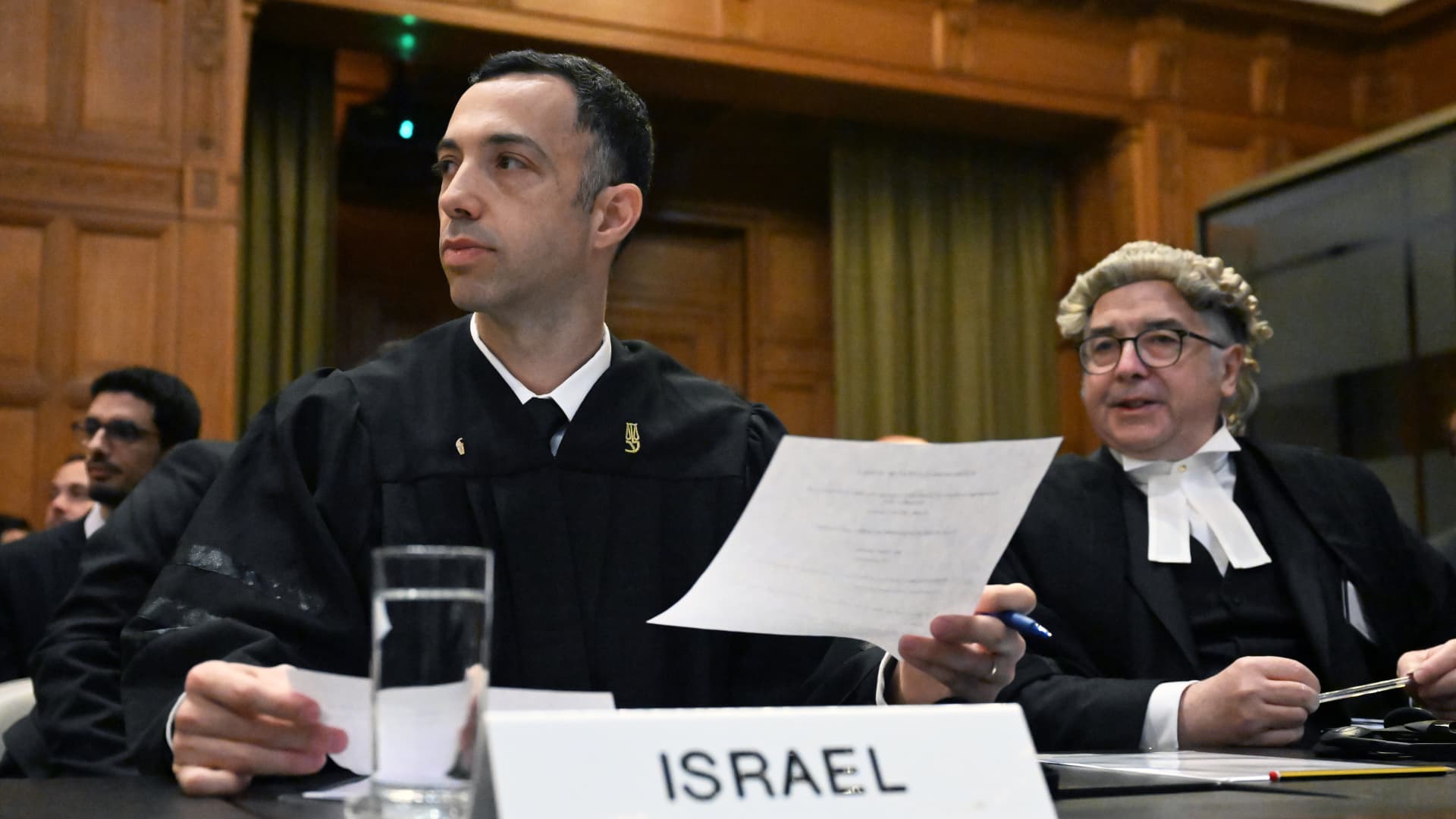The hearing of Israel’s defense at the International Court of Justice on Jan. 12, 2024, in the Hague, Netherlands.
Dursun Aydemir | Anadolu | Getty Images
Last month, the International Court of Justice ruled on South Africa’s legal case accusing Israel of genocide.
Legal proceedings began after the African country submitted cause for emergency measures in Gaza, leading to a two-day hearing, with testimonies from the South African and Israeli legal teams.
The court issued its interim ruling on Jan. 26 with six legally binding provisions, including those ordering the Israeli army to: prevent acts that might be considered genocide in the besieged enclave; allow humanitarian aid into the strip; punish incitement to genocide; submit monthly reports; and take measures to protect Palestinians.
CNBC takes a look at what the next steps could be, and how we got here.
What’s next?
In the ICJ’s order last month, it did not grant South Africa’s main request, which was to order Israel to suspend military airstrikes in Gaza and to call for a permanent cease-fire.
Israel rebuffed the allegations of genocide at the World Court and accused South Africa of being used as a legal cover for Hamas.
After the ruling, Israeli Prime Minister Benjamin Netanyahu rejected the decision and said Israel will continue to defend itself and its citizens against Hamas while adhering to international law. Israeli officials did not respond to a CNBC request for comment.
Cases under the Genocide Convention at the court have stretched for years — such as with Serbia — which took more than 10 years to reach a final decision.
Cases relating to genocidal intent are among the most difficult to win — evidence must show that the perpetrators have a premeditated intent to destroy a national, ethnic, racial or religious group.
The ICJ has ordered Israel to submit a report this month describing how it’s complying with the court’s orders and to keep evidence of any acts of genocide.
Last week, Yoav Gallant, Israel’s defense minister, said Israel will not cease airstrikes on Gaza anytime soon. Gallant, who has called Palestinians “human animals,” was one of three officials whose past statements the South African legal team’s defense used.
Francesca Albanese, the U.N. Special Rapporteur on the situation of human rights in the Palestinian territories occupied since 1967, told CNBC last week that she is “not comfortable in knowing nothing of history.”
“Therefore I know with absolute certainty that in 100 years, Palestinians have steadily been denied all the the three things: justice, human rights, and freedom.”

Albanese said that regardless of the outcome, the case is an important contribution to mounting international pressure to end the war and is of symbolic significance, adding that the allegations of genocide at the ICJ are not without merit.
Vincent Magwenya, spokesperson for South African President Cyril Ramaphosa, told CNBC that the country expects to keep pushing the case at a high level.
“We are working together to ensure that the case is successful for the sake of peace in the region and for the sake of many innocent people, women, and children, young and old who are suffering from Israel’s decades of occupation and genocide,” he said.
How did we get here?
South Africa began proceedings against Israel in December before the International Court of Justice under the “Application of the Convention on the Prevention and Punishment of the Crime of Genocide in the Gaza Strip.”
“As a nation that fought and defeated apartheid, we have a particular obligation to stand up for justice and fundamental human rights for all people everywhere,” Magwenya told CNBC Sunday.
South Africa’s legal defense was heard on Jan. 11, and Israel’s on the following day at The Hague in the Netherlands.
“It is this obligation that informed our application to the International Court of Justice to halt the violence unleashed by Israel on the Gaza Strip,” Magwenya added.
Magwenya said that as a signatory to the 1948 Genocide Convention, the country carries a responsibility to prevent acts of genocide, wherever they occur. He added their own past “demonstrates South Africa’s long history of unwavering solidarity with Palestinians.”
Other countries that publicly supported South Africa’s case include Turkey, Jordan, Brazil, Colombia and Malaysia.
That comes as Israeli forces continue a military campaign in the Gaza Strip that has so far claimed more than 27,000 lives, according to the Hamas-run Palestinian Health Ministry.
The court also said it was “gravely concerned” about the welfare of the Israeli hostages abducted by Palestinian militant group Hamas during its Oct. 7 terror attacks, of which more than 120 remained in captivity as of Thursday. The world court called for the immediate release of those hostages still in captivity.
Precedents
Though the ICJ can issue demands on the countries it has done in the past, it does not have the jurisdiction to enforce them or the rulings on disputes between states.
On Feb. 26, 2022, two days after Russia invaded Ukraine, the Ukrainian government lodged a case with the World Court under the 1948 Genocide Convention and requested that it order Russia to halt military operations.
The following month, the ICJ issued a fast-tracked decision that demanded Russia cease military operations on its neighbor. Back in 2015, after an initial application was submitted in 1999, the court acquitted Serbia of committing genocide against Bosnian Muslims during the 1990s Bosnian war in its final judgment and rejected Bosnia and Croatia’s request for reparations.


